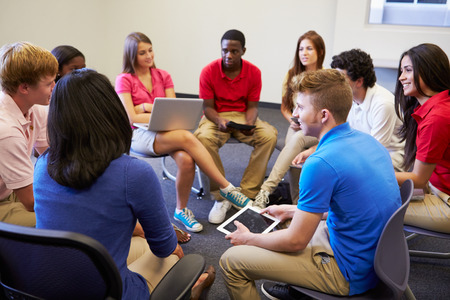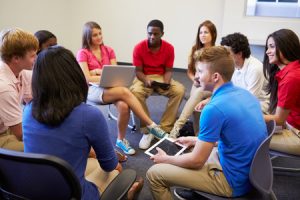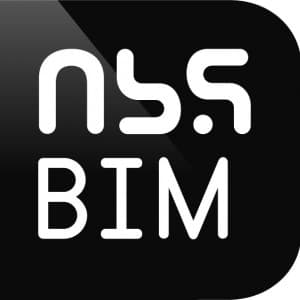Play To Their Strengths

 It’s a traditional view that teenagers are grumpy and difficult, both at home and in the classroom. Generally, teaching is geared towards getting them to conform to certain behaviours, but this strategy might be a mistake.
It’s a traditional view that teenagers are grumpy and difficult, both at home and in the classroom. Generally, teaching is geared towards getting them to conform to certain behaviours, but this strategy might be a mistake.
Research has shown that the developing teenage brain might be naturally impulsive, nosy, and easily distracted. Therefore, we should be using these insights to construct educational plans that play to their strengths.
Another consideration is the social aspect of teenage students. In educational settings, they naturally look for socialising opportunities. Discouraging these may harm their education and hamper their future success.
Playing To The Strengths Of The Teenage Brain
Instead, we should be looking at using the teenage brain’s natural processes to guide lesson plans. This social brain is especially good at associating interactions with fellow students, with facts and figures.
There aren’t limitations on how this learning can take place. For instance, students can act out plays where they are encouraged to tell a historic story or act out a scene from a book. Alternatively, you can task students with a more academic task, to work as a group on maths and science problems.
Adding these scenarios into lessons could be a good way to encourage learning without resistance from the students themselves. A sort of a backdoor to learning effectively.
Likewise, students are not always able to concentrate. Distractions should not be frowned upon; but, instead, you should look to take advantage of distractions by encompassing them into lessons. For instance, if a student stops working to watch something that’s going on outside a French class, perhaps ask them to use as many French words as possible to describe what’s happening.
Five Tips For Using The Teenager’s Social Brain
Try these five tips for utilising your students’ social brain in the classroom.
- Try interactive group work where students can share their thoughts and knowledge, and report their findings to the whole class.
- Don’t place students in embarrassing situations. For instance, don’t ask a student to answer a question if they seem distracted.
- Make lessons relevant. Teenagers are motivated by their own desires, goals and interests. So, set learning styles to match that, i.e. write a story about a historic event, create a song, act out a play, etc.
- Provide students with better memory tools. Teenagers can quickly forget, but memories can be jogged with engagement and visual aids.
- Remember that teenagers are trying to assert their independence. Give them some autonomy like asking for teaching feedback.
How will you use the teenager’s social brain in the classroom? Do you already allow for social interaction in your classroom?
Tell us about your experiences in the comments.
Able Canopies Ltd. design, manufacture and install canopies and shade structures
at schools, nurseries and educational settings to enable year-round
Free Flow Outdoor Play and Outdoor Learning.
For more information please contact us
Follow us on our social media accounts for the latest funding advice, new products & latest news:
Twitter | Facebook | Google + | Linked In
Categories
- Canopies for Architects & Contractors
- Canopies for Healthcare
- Canopies for Restaurants, Bars and Hotels
- Canopies for Retail & Commercial
- Canopies for Schools
- Canopies for Sports & Leisure
- Canopy Maintenance
- Case Studies
- Cool Links & Facts
- Cycle Parking Solutions
- Dates for Your Diary
- Eco-Friendly Holiday Crafts
- Employee Spotlight
- Environmental Tips
- Funding and Fundraising
- How to... Get the Most out of Your Canopy
- Latest News
- Latest Stories
- Lockdown Outdoor Learning & Play Ideas
- MD News
- Newsletters - Architects & Contractors
- Newsletters - Schools & EYFS
- Outdoor Learning
- Outdoor Play
- Planning Your Cycle Parking
- Product Focus
- Solar Carports
- Spring Fundraisers 2017
- Summer Shade
- The Good Canopy Guide
- Wall Mounted Canopies












